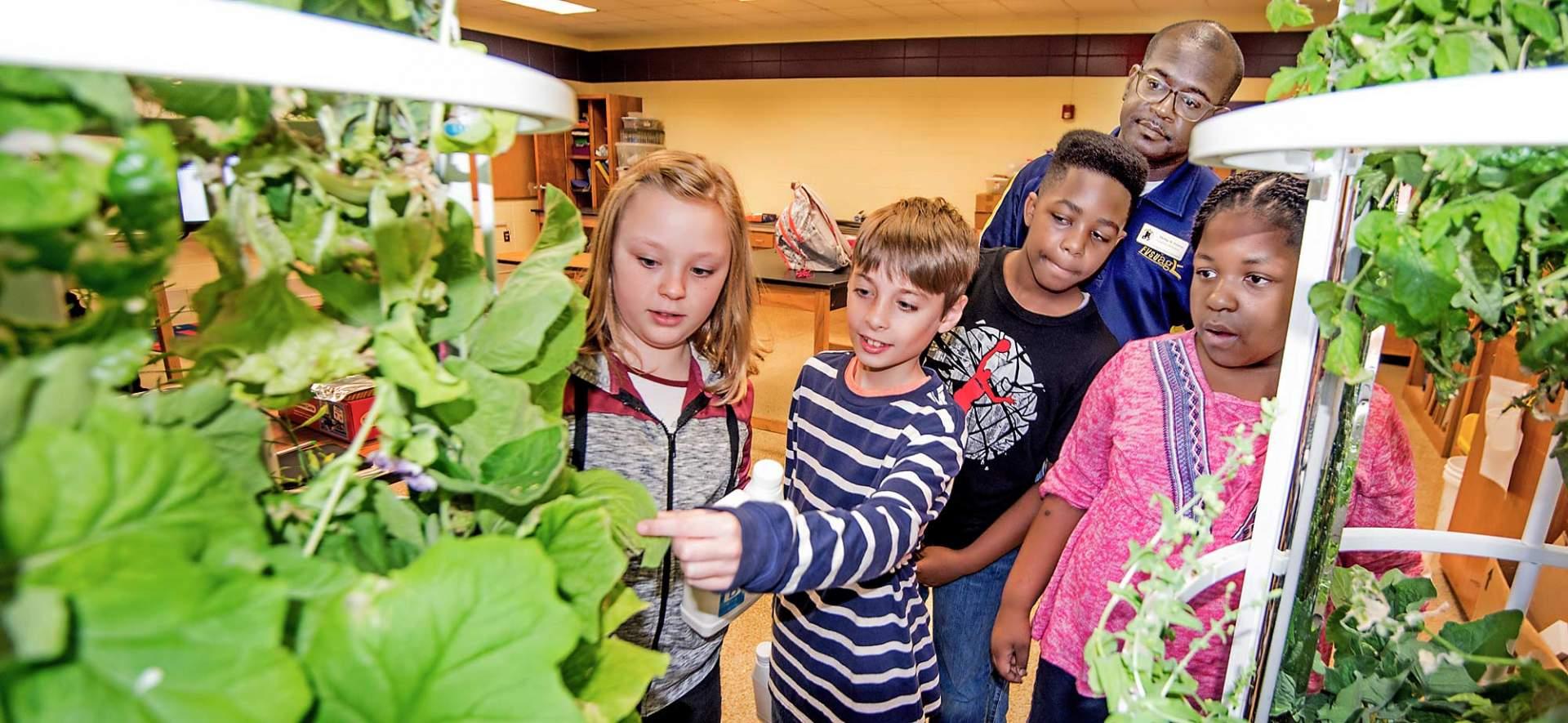More than 2000 youth from across the state of Georgia are growing fresh produce without digging their hands in the earth’s soil.
State-of-the-art innovative growing technology allows Fort Valley State University’s 4-H Club members across Georgia to use a modern growing technique called aeroponics. Aeroponics is the practice of growing plants in air or mist environments rather than soil.
Using aeroponics, 4-H’ers are growing fresh vegetables, such as herbs and flowers in a short amount of time with minimal resources like water, fertilizers and sunlight.
The use of aeroponics is the major component in the FVSU 4-H project called, Serving, Education, Research, Volunteering and Entrepreneurship (SERVE).
SERVE, created by Woodie Hughes Jr., FVSU’s state 4-H youth development program leader, allows 4-H’ers to grow produce, conduct research and share the harvest within their communities.
This ongoing project which began in 2016, aims to teach 4-H’ers Science, Technology Engineering, Agriculture and Mathematics (STEAM) skills, along with community service and entrepreneurship. Through grant funds, Hughes was able to purchase 50 aeroponic towers.
“Every 10 towers are equivalent to approximately three acres of land. With the aeroponic towers, we have the ability to grow 560 plants every 30 days,” Hughes said.
FVSU students and agriculture professors built the towers and distributed them among 4-H partners across the state in 2016. The towers are located at FVSU, Peach and Twiggs County schools, the Blount Youth Home in Toombs County, Ga., a community garden in Sylvester Georgia and a non-profit organization in Centerville, Ga. Among these locations, more than 2000 4-H’ers interact with the towers.
Paulette Lemons, director of Connections on the Parkway, a non-profit organization that works to strengthen families in Warner Robins, holds 10 of the 50 towers. Lemon’s says FVSU is a helpful partner for her non-profit.
“FVSU brings a wealth of knowledge from an agriculture perspective, it gives our organization credibility,” Lemons said.
Lemons, who is a 4-H Club coordinator, said the SERVE project helps 4-H’ers learn alternate ways of growing and how to use technology to improve the growing process.
The non-profit director said she takes the towers to facilities with children to include churches and schools, and students also visit her facility to help. 4-H’ers visit during the evenings and weekends to harvest, clean, pull weeds, evaluate the systems and monitor the plants.
In addition to the partnership in Houston County, the 4-H SERVE project is also active in South Georgia in Worth County. Sam X. White, owner of the Village Community Garden in Sylvester, holds 10 towers. White, who is also a 4-H Club coordinator, grows kale, collards and herbs.
The community service advocate said the aeroponic towers represent a way to bridge the gap between old school and new school. He explained how many youth are not excited about agriculture because they perceive it to be one dimensional, mostly dealing with traditional farming and animals.
“The towers incorporate technology. The students like the idea of planting in volcanic ash and in 21-28 days whatever you plant, you’ll be able to eat it, ” White said.
Once produce if full grown, White said it is given away to people in the community. The community garden coordinator says it gives the 4-H’ers a sense of pride and accomplishment, especially when they can explain the process to adults.
White said numerous visitors travel to the community garden and inquire about aeroponics. Excitedly, he directs visitors to his 4-H Club members, specifically Janya Green, his farm manager, a local 4-H club member in Sylvester.
“My thrill is when the farmers come here and they’re asking about aeroponics, and my 13 year- old farm manager is explaining to them how it works, the yields and things of that nature,” Smith said.
For more information about the SERVE project, contact Woodie Hughes Jr. at (478) 825-6219 or hughesw@fvsu.edu

